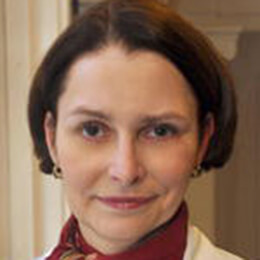
Division Director, Maternal Fetal Medicine and Reproductive Genetics
Brigham and Women’s Hospital
Clinical Lead, Maternal Fetal Care Center, Boston Children’s Hospital
Professor of Obstetrics, Gynecology and Reproductive Biology, Harvard Medical School
Dr. Louise
Wilkins-Haug is the Division Director of Maternal Fetal Medicine and
Reproductive Genetics at the Brigham and Women’s Hospital. She is
board-certified in Medical Genetics, Obstetrics and Gynecology and Maternal
Fetal Medicine. Dr. Wilkins-Haug received her bachelor's degree from
James Madison University in Biology. She completed her PhD in Human Genetics at
Medical College of Virginia. She received her MD degree in Medicine at
Stanford University School of Medicine. She has over two decades of
experience leading a prenatal Down syndrome screening program and currently
oversees the genetic counseling, perinatal consultation, fetal treatment and
diagnostic testing at BWH. She is an active clinical provider in the Maternal
Fetal Medicine practice and provides continuity care for women with high risk
pregnancies. This high-risk office has a national and international referral
base and provides care and delivery for >2000 women a year. From this
experience, she has witnessed the challenges faced by obstetric providers with
the evaluation and application of genetic testing for stillbirth, leading to
our institution’s implementation of a standard protocol for clinical evaluation
of stillbirth and quarterly reviews of all stillbirths at BWH.
Dr. Wilkins-Haug has been
the lead fetal interventionist for a 20-year collaborative program with Boston
Children's Hospital to alter the natural in utero history of aortic stenosis
evolving to hypoplastic left heart syndrome. Our program established the
safety and efficacy of fetal aortic valve dilation, and continues to assess
predictors of success, examines cardiac, medical and neurologic outcomes and
participates in the training of individuals who have successfully established
similar programs at institutions worldwide.

Division Director, Maternal Fetal Medicine and Reproductive Genetics
Brigham and Women’s Hospital
Clinical Lead, Maternal Fetal Care Center, Boston Children’s Hospital
Professor of Obstetrics, Gynecology and Reproductive Biology, Harvard Medical School
Dr. Louise
Wilkins-Haug is the Division Director of Maternal Fetal Medicine and
Reproductive Genetics at the Brigham and Women’s Hospital. She is
board-certified in Medical Genetics, Obstetrics and Gynecology and Maternal
Fetal Medicine. Dr. Wilkins-Haug received her bachelor's degree from
James Madison University in Biology. She completed her PhD in Human Genetics at
Medical College of Virginia. She received her MD degree in Medicine at
Stanford University School of Medicine. She has over two decades of
experience leading a prenatal Down syndrome screening program and currently
oversees the genetic counseling, perinatal consultation, fetal treatment and
diagnostic testing at BWH. She is an active clinical provider in the Maternal
Fetal Medicine practice and provides continuity care for women with high risk
pregnancies. This high-risk office has a national and international referral
base and provides care and delivery for >2000 women a year. From this
experience, she has witnessed the challenges faced by obstetric providers with
the evaluation and application of genetic testing for stillbirth, leading to
our institution’s implementation of a standard protocol for clinical evaluation
of stillbirth and quarterly reviews of all stillbirths at BWH.
Dr. Wilkins-Haug has been
the lead fetal interventionist for a 20-year collaborative program with Boston
Children's Hospital to alter the natural in utero history of aortic stenosis
evolving to hypoplastic left heart syndrome. Our program established the
safety and efficacy of fetal aortic valve dilation, and continues to assess
predictors of success, examines cardiac, medical and neurologic outcomes and
participates in the training of individuals who have successfully established
similar programs at institutions worldwide.
Journal article
Objective To present stepwise refinements to HomeSafe, an Epic-tethered, population-health-coordinated postpartum pathway for blood pressure surveillance after hypertensive disease of pregnancy (HDP). Study Design HomeSafe was designed for HDP people identified during their delivery hospitalization. The program incorporated pre-populated orders for home blood pressure measurement and submission through a smartphone application linked to the electronic health record (Epic).1 A population health...